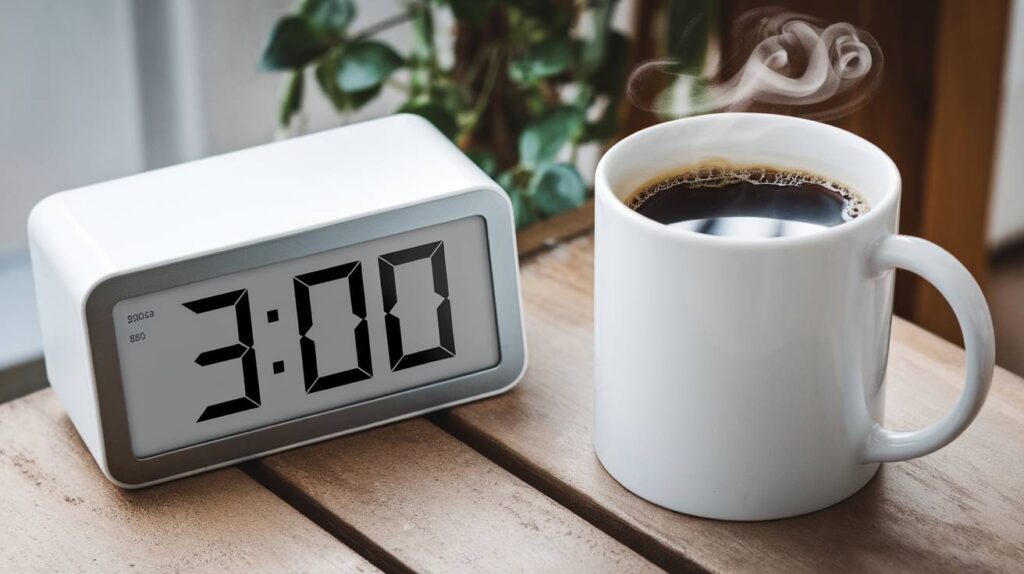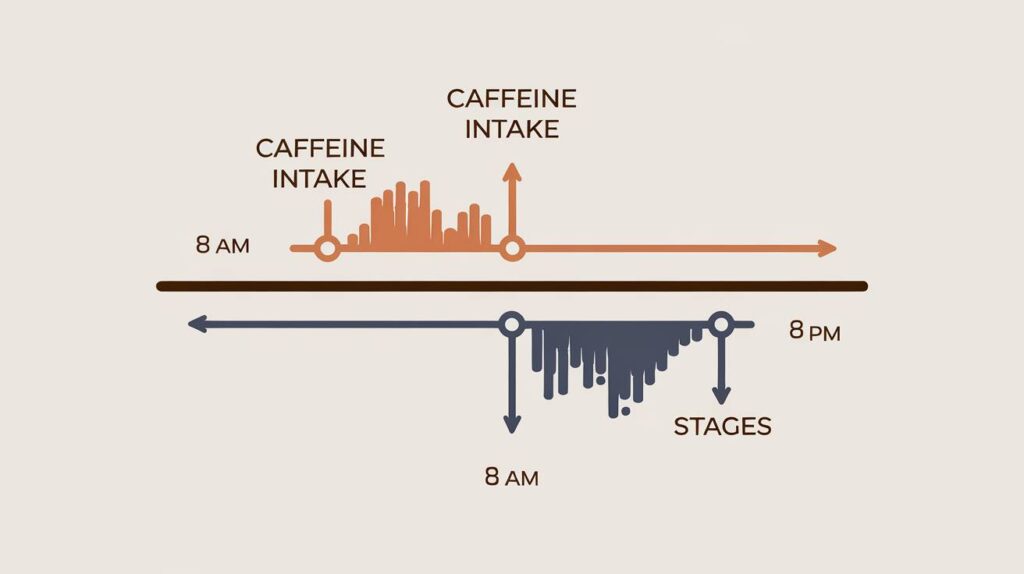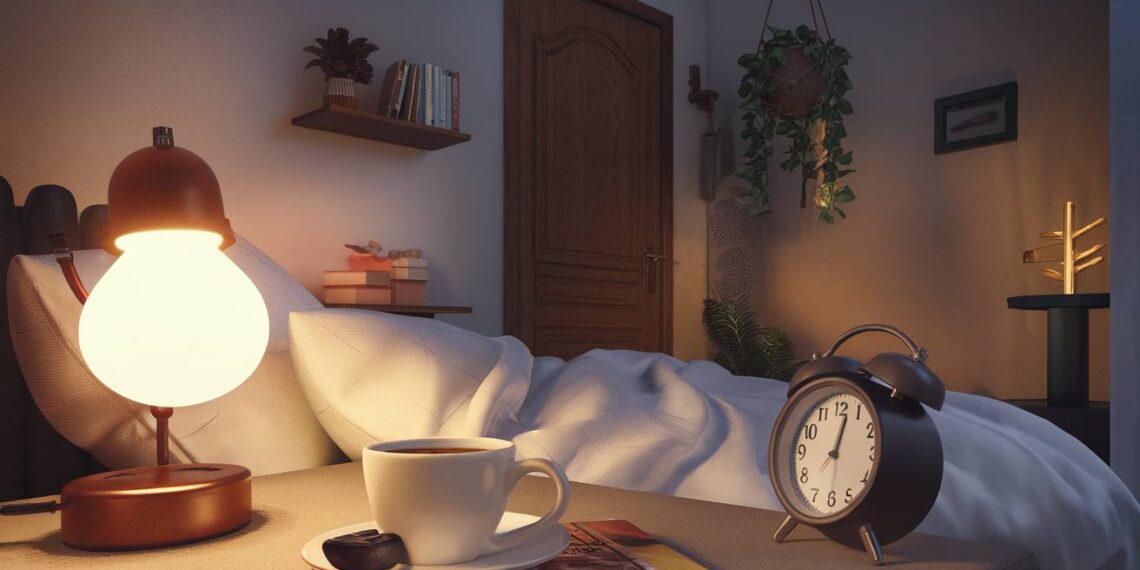Caffeine: the elixir that fuels our mornings and powers our afternoons. But while it boosts alertness, it’s not all perk and no consequence. Have you ever wondered how your favorite cup of coffee affects your sleep? This article unpacks the science behind caffeine’s impact on sleep patterns, delving into how it alters sleep onset, quality, and efficiency. Whether you’re a casual tea drinker or a coffee enthusiast, understanding caffeine’s role in disrupting your rest might just help you reclaim your nights and restore your sleep health.
Key Takeaways
- Caffeine interferes with sleep quality, delaying sleep onset and reducing total sleep time.
- It can disrupt sleep efficiency by causing more frequent awakenings.
- Individual sensitivity to caffeine varies based on genetics, metabolism, and habitual use.
- Timing is critical: caffeine consumed closer to bedtime has stronger negative effects on sleep.
- Best practices include limiting daily caffeine to 400 mg and avoiding it 6+ hours before sleep.
The Effect of Caffeine Consumption on Subsequent Sleep Patterns
Caffeine consumption is a widespread habit in modern society, with millions of people relying on its stimulating effects to kickstart their day or maintain alertness. However, the relationship between caffeine intake and sleep quality has become a subject of increasing concern among sleep researchers and health professionals. This article delves into the intricate effects of caffeine on sleep patterns, exploring how this popular stimulant influences various aspects of our nightly rest and what it means for our overall sleep health.
“Caffeine blocks adenosine, the body’s natural sleep-promoting chemical, delaying your transition to slumber.”
How does caffeine affect sleep quality?
The effect of caffeine on sleep quality is multifaceted and can significantly impact various aspects of our sleep patterns. Caffeine is a potent stimulant that acts on the central nervous system, promoting wakefulness and alertness. When consumed, especially in the hours leading up to bedtime, caffeine can interfere with our body’s natural sleep-wake cycle, known as the circadian rhythm. This interference can lead to a reduction in total sleep time and alter the overall quality of our rest.

What is the relationship between caffeine intake and sleep onset?
One of the most noticeable effects of caffeine on sleep is its impact on sleep onset, or the time it takes to fall asleep. Caffeine consumption, particularly in the evening hours, can significantly delay sleep onset. This delay occurs because caffeine blocks adenosine receptors in the brain, which are responsible for promoting sleepiness. As a result, individuals who consume caffeine late in the day may find themselves lying awake in bed, unable to drift off to sleep. This prolonged sleep latency can lead to frustration and anxiety about sleep, further exacerbating sleep problems.
Does caffeine consumption influence total sleep time?
Caffeine intake can indeed affect total sleep time, often leading to a reduction in the overall duration of sleep. This is partly due to the delayed sleep onset mentioned earlier, but it can also result from increased sleep fragmentation throughout the night. Caffeine’s stimulating effects can cause more frequent awakenings or periods of lighter sleep, reducing the amount of deep, restorative sleep we experience. Consequently, even if an individual spends the same amount of time in bed, the actual time spent sleeping may be significantly diminished, potentially leading to sleep deprivation over time.
Can caffeine impact sleep efficiency?
Sleep efficiency, which refers to the ratio of time spent asleep to the total time spent in bed, can be negatively affected by caffeine use. The consumption of caffeine can lead to more frequent wake after sleep onset (WASO) episodes, where individuals briefly awaken during the night. These awakenings, even if not remembered, can disrupt the natural progression through sleep stages and reduce overall sleep efficiency. Furthermore, caffeine may alter the distribution of sleep stages, potentially reducing the amount of slow-wave sleep, which is crucial for physical restoration and cognitive function.
What is the recommended dose of caffeine to avoid sleep disturbances?
Determining the optimal dose of caffeine to avoid sleep disturbances is a complex issue, as individual responses to caffeine can vary widely. However, sleep medicine specialists generally recommend limiting caffeine intake, especially in the latter part of the day, to minimize its effects on sleep.

How much caffeine is too much before bedtime?
The amount of caffeine considered “too much” before bedtime can differ from person to person, but as a general guideline, most sleep experts advise against consuming any caffeine within 6 hours of bedtime. For some individuals, even caffeine consumed earlier in the day can affect sleep. A typical cup of coffee contains about 95 mg of caffeine, and studies have shown that even moderate doses of 200-300 mg can have significant effects on subsequent sleep. To maintain healthy sleep habits, it’s often recommended to limit total daily caffeine intake to no more than 400 mg for adults.
Are there individual differences in caffeine sensitivity?
Indeed, there are substantial individual differences in caffeine sensitivity, which can affect how caffeine impacts sleep patterns. Factors such as genetics, age, body weight, and habitual caffeine consumption can all influence an individual’s response to caffeine. Some people may be highly sensitive to caffeine’s effects and experience sleep disturbances from even small amounts, while others may be able to consume caffeine later in the day without noticeable impacts on their sleep. Understanding one’s personal caffeine sensitivity is crucial for managing its effects on sleep quality.
How does the timing of caffeine consumption affect sleep?
The timing of caffeine consumption plays a crucial role in its effects on sleep. Caffeine has a half-life of approximately 5-6 hours, meaning that half of the caffeine consumed remains in your system after this time. However, for some individuals, the effects can last much longer. Consuming caffeine in the morning or early afternoon generally has less impact on nighttime sleep compared to consumption in the evening or close to bedtime. Late-day caffeine intake is more likely to interfere with sleep onset and reduce sleep efficiency, making it important to be mindful of when you consume caffeinated beverages or foods.
Can chronic caffeine use lead to long-term sleep issues?
Chronic caffeine use and its potential to cause long-term sleep issues is a topic of ongoing research in sleep medicine. While the immediate effects of caffeine on sleep are well-documented, the long-term consequences of habitual caffeine consumption on sleep patterns are more complex and can vary among individuals.
What are the effects of daily caffeine intake on sleep patterns?
Daily caffeine intake can have cumulative effects on sleep patterns over time. Regular caffeine users may experience a gradual shift in their sleep-wake cycle, with delayed sleep onset becoming more common. This can lead to a cycle of relying on caffeine to combat daytime sleepiness caused by poor nighttime sleep, further perpetuating sleep disturbances. Additionally, chronic caffeine use may alter sleep architecture, potentially reducing the amount of deep, slow-wave sleep and REM sleep, both of which are critical for cognitive function and overall health.
Is there a link between caffeine consumption and sleep deprivation?
There is indeed a potential link between habitual caffeine consumption and sleep deprivation. While caffeine can temporarily mask the effects of sleep deprivation by increasing alertness, it does not replace the need for sleep. Regular caffeine users may find themselves in a cycle where they rely on caffeine to function during the day due to poor sleep quality at night, leading to further sleep debt. This can result in chronic sleep deprivation, which has been associated with numerous health risks, including impaired cognitive function, mood disorders, and increased risk of cardiovascular disease.

How does caffeine tolerance affect sleep over time?
Caffeine tolerance is an important factor to consider when examining the long-term effects of caffeine on sleep. Regular caffeine users often develop a tolerance to its stimulating effects, requiring higher doses to achieve the same level of alertness. This tolerance can lead to increased caffeine consumption, potentially exacerbating sleep issues. However, it’s important to note that while individuals may develop a tolerance to some of caffeine’s effects, research suggests that tolerance to its sleep-disrupting properties may not fully develop, meaning that even habitual caffeine users may continue to experience sleep disturbances from their caffeine intake.
What are the best practices for caffeine consumption to improve sleep hygiene?
Improving sleep hygiene while balancing caffeine consumption requires mindful practices and an understanding of how caffeine affects your individual sleep patterns. By adopting certain strategies, you can enjoy the benefits of caffeine while minimizing its adverse effects on sleep quality.
When should you stop consuming caffeine before bedtime?
To maintain good sleep hygiene, it’s generally recommended to stop consuming caffeine at least 6 hours before bedtime. However, given individual variations in caffeine sensitivity and metabolism, some people may need to cut off caffeine consumption even earlier. Paying attention to your own body’s responses and adjusting your caffeine intake accordingly is crucial. If you find that you’re having trouble falling asleep or experiencing restless sleep, consider gradually moving your last caffeine consumption earlier in the day until you find a time that doesn’t interfere with your sleep onset or quality.
“When it comes to caffeine, timing is everything—consume too late, and sleep pays the price.”
Are there alternatives to caffeine that won’t disrupt sleep?
For those looking to reduce their caffeine intake or find alternatives that won’t disrupt sleep, there are several options available. Herbal teas, such as chamomile or peppermint, can provide a soothing, caffeine-free beverage option. Some people find that switching to decaffeinated coffee or tea in the afternoon can help maintain their routine without affecting sleep. Additionally, natural energy boosters like regular exercise, staying hydrated, and maintaining a balanced diet can help sustain energy levels throughout the day without relying on caffeine. It’s important to remember that even decaffeinated beverages may contain small amounts of caffeine, so reading labels and being aware of hidden sources of caffeine is crucial for those sensitive to its effects.

How can you balance caffeine intake with good sleep habits?
Balancing caffeine intake with good sleep habits requires a holistic approach to sleep hygiene. Start by establishing a consistent sleep schedule, aiming to go to bed and wake up at the same time each day, even on weekends. Create a relaxing bedtime routine that doesn’t involve caffeine consumption. Be mindful of your daily caffeine intake, tracking not only coffee but also other sources like tea, chocolate, and certain medications. Consider gradually reducing your overall caffeine consumption or shifting it to earlier in the day. Combine these practices with other sleep-promoting habits, such as regular exercise (though not too close to bedtime), creating a cool and dark sleeping environment, and limiting screen time before bed. By integrating these strategies, you can work towards optimizing both your caffeine use and your sleep quality.
| Topic | Caffeine Impact | Best Practices |
|---|---|---|
| Sleep Onset | Delays falling asleep by blocking adenosine | Avoid caffeine 6+ hours before bedtime |
| Total Sleep Time | Reduces sleep duration | Limit daily caffeine to 400 mg |
| Sleep Efficiency | Increases nighttime awakenings | Monitor hidden caffeine sources |
| Hidden Caffeine Sources | Found in chocolates, teas, and medicines | Read product labels carefully |
How does caffeine content in different beverages affect subsequent sleep?
The caffeine content in various beverages can have differing impacts on subsequent sleep, making it important to understand not just when you consume caffeine, but also in what form and quantity. Different beverages contain varying amounts of caffeine, and their effects on sleep can be influenced by other ingredients present in the drink.
What is the caffeine content in common beverages?
The caffeine content in common beverages can vary widely. A standard 8-ounce cup of brewed coffee typically contains between 80-100 mg of caffeine, while the same amount of black tea usually has about 14-70 mg. Soft drinks generally contain less caffeine, with most cola beverages providing around 30-40 mg per 12-ounce serving. Energy drinks, however, can contain significantly higher amounts, often ranging from 70-240 mg per 8-ounce serving. It’s important to note that these are average values, and actual caffeine content can vary based on factors such as brewing method, brand, and serving size. Being aware of the caffeine content in your preferred beverages can help you make informed decisions about your caffeine consumption, especially when considering its potential effects on your sleep patterns.
Do energy drinks have a more significant impact on sleep than coffee?
Energy drinks often have a more significant impact on sleep compared to coffee, primarily due to their higher caffeine content and the presence of other stimulating ingredients. While a cup of coffee typically contains around 100 mg of caffeine, many energy drinks contain two to three times that amount. Additionally, energy drinks often include other stimulants such as taurine, B-vitamins, and herbal supplements like guarana, which can enhance or prolong the stimulating effects. The combination of these ingredients can lead to more pronounced sleep disturbances, including longer sleep latency, reduced sleep efficiency, and decreased total sleep time. Furthermore, the marketing and consumption patterns of energy drinks may encourage their use later in the day compared to coffee, potentially exacerbating their negative effects on sleep.
hidden sources of caffeine that might be affecting your sleep
Many people are unaware of hidden sources of caffeine that could be affecting their sleep quality. While coffee and tea are well-known caffeine sources, caffeine can also be found in a variety of other products. Chocolate, especially dark chocolate, contains caffeine, with a 1-ounce serving of dark chocolate providing about 12 mg of caffeine. Some ice creams and yogurts, particularly those with coffee or chocolate flavors, may contain significant amounts of caffeine. Certain medications, including some pain relievers and cold medicines, also contain caffeine as an active ingredient. Even some supplements and weight loss products may include caffeine or caffeine-like substances. Being vigilant about reading labels and understanding the caffeine content of various foods and products can help you identify and eliminate hidden sources of caffeine that might be impacting your sleep patterns.
What does sleep medicine say about the effects of caffeine on sleep quality?
Sleep medicine has extensively studied the effects of caffeine on sleep quality, providing valuable insights into how this widely consumed stimulant impacts our nightly rest. The field of sleep medicine recognizes caffeine as a significant factor in sleep disturbances and has conducted numerous studies to understand its mechanisms and effects on various aspects of sleep.
What are the latest research findings on caffeine and sleep?
Recent research in sleep medicine has further elucidated the complex relationship between caffeine and sleep. Studies have shown that caffeine can affect sleep even when consumed 6 hours before bedtime, highlighting the importance of timing in caffeine consumption. Research has also revealed that caffeine can reduce slow-wave sleep, the deepest and most restorative stage of sleep, even in individuals who report no subjective effects on their sleep quality. Additionally, new studies are exploring how caffeine interacts with other factors such as stress, age, and individual genetic variations in caffeine metabolism. These findings underscore the need for personalized approaches to caffeine consumption and sleep management.
How do sleep specialists recommend managing caffeine intake?
Sleep specialists generally recommend a cautious approach to caffeine intake, especially for individuals experiencing sleep issues. They often advise limiting caffeine consumption to the morning hours and avoiding it entirely in the late afternoon and evening. Some sleep medicine practitioners suggest a gradual reduction in caffeine intake for habitual users, rather than abrupt cessation, to minimize withdrawal symptoms. They also emphasize the importance of consistent sleep schedules and good sleep hygiene practices in conjunction with managing caffeine intake. For those with persistent sleep problems, sleep specialists may recommend keeping a caffeine and sleep diary to identify patterns and make targeted adjustments to improve sleep quality.
medical conditions that make people more susceptible to caffeine’s effects on sleep
Sleep medicine research has identified several medical conditions that can make individuals more susceptible to caffeine’s effects on sleep. People with anxiety disorders may experience heightened sensitivity to caffeine, leading to increased alertness and difficulty falling asleep. Those with sleep disorders such as insomnia or sleep apnea may find that caffeine exacerbates their symptoms. Individuals with certain heart conditions may be more sensitive to caffeine’s stimulant effects, potentially leading to increased heart rate and blood pressure, which can interfere with sleep. Additionally, some medications can interact with caffeine, altering its metabolism in the body and potentially prolonging its effects on sleep. Sleep specialists often recommend that individuals with these conditions pay particular attention to their caffeine intake and its timing, and in some cases, may advise avoiding caffeine altogether to improve sleep quality and overall health.
Main Tips
- Avoid caffeine at least 6 hours before bedtime.
- Limit total daily intake to 400 mg for adults.
- Be aware of hidden sources of caffeine in foods and medications.
- Replace late-day caffeine with herbal teas or water.
Conclusion
Caffeine is a powerful stimulant that boosts energy and focus, but its impact on sleep cannot be ignored. Consuming caffeine late in the day disrupts sleep onset, reduces total sleep time, and alters sleep efficiency. Regular caffeine use can create a cycle of dependence, where poor sleep leads to increased consumption, compounding the problem. Individual differences in caffeine sensitivity mean there’s no universal rule, but being mindful of intake and timing is key. By balancing your love of caffeine with healthy sleep hygiene, you can enjoy the best of both worlds: energized days and restful nights.
FAQ
How does caffeine consumption affect sleep duration?
Caffeine consumption, especially in the hours leading up to bedtime, can significantly reduce total sleep time. Studies have shown that caffeine can delay sleep onset and decrease overall sleep duration, potentially leading to insufficient sleep if consumed regularly or in high doses.
What impact does caffeine have on subjective sleep quality?
Caffeine can negatively affect subjective sleep quality. Consumers often report lighter, less restful sleep following caffeine intake. This reduced quality of sleep can lead to feelings of fatigue and decreased alertness the next day, even if the total sleep time remains relatively unchanged.
How long before bedtime should caffeine consumption be avoided?
According to the American Academy of Sleep Medicine, it’s recommended to avoid caffeine for at least 6 hours prior to sleep. This is due to the half-life of caffeine, which can range from 3 to 7 hours. Consuming caffeine too close to bedtime can lead to sleep disruption and reduced total sleep time.
Does the caffeine dose affect the severity of sleep disturbances?
Yes, the caffeine dose plays a significant role in the severity of sleep disturbances. High doses of caffeine are more likely to cause pronounced effects on subsequent sleep patterns, including longer sleep latency, reduced total sleep time, and more frequent awakenings during the night.
Can regular caffeine consumers develop a tolerance to its effects on sleep?
While some habitual caffeine consumers may develop a partial tolerance to its stimulating effects, research suggests that regular use of caffeine can still impact sleep quality and duration. Even in individuals who consume caffeine daily, the substance can continue to affect sleep behaviors and nocturnal sleep patterns.
How does caffeine consumption interact with sleep deprivation?
Caffeine is often used to combat the effects of sleep loss or total sleep deprivation. However, while it can temporarily increase alertness, it doesn’t replace the need for sleep. The use of caffeine to mask sleep deprivation can lead to a cycle of poor sleep quality and increased caffeine dependence.
Are there any long-term consequences of using caffeine to manage sleep patterns?
The long-term use of caffeine to manage sleep patterns can have adverse effects. It may lead to chronic sleep disruption, increased anxiety, and potential dependence. Additionally, relying on caffeine to compensate for insufficient sleep can mask underlying sleep disorders or health issues that require proper medical attention.
How does the timing of caffeine consumption affect its impact on sleep?
The timing of caffeine intake is crucial in determining its effects on sleep. Caffeine consumed earlier in the day generally has less impact on nighttime sleep compared to consumption in the late afternoon or evening. The present study and others have shown that caffeine administration closer to bedtime is more likely to cause sleep disruption and reduce total sleep time.
Resources
- American Academy of Sleep Medicine: Caffeine and Sleep
- National Sleep Foundation: How Caffeine Impacts Sleep
- Harvard Health Publishing: Sleep and Caffeine
Final Thoughts
Caffeine is a double-edged sword: it can elevate your energy levels while quietly stealing your rest. To make the most of caffeine without sacrificing sleep, consider limiting your intake, consuming it earlier in the day, and exploring healthier energy-boosting alternatives. Remember, your nights are just as important as your days, and finding a balance is key to thriving both mentally and physically.
Recommended Products
- Chamomile Tea: A calming alternative to caffeine.
- Decaf Coffee: Enjoy the coffee ritual without the stimulant.
- Blue Light Glasses: Promote better sleep when used before bedtime.








